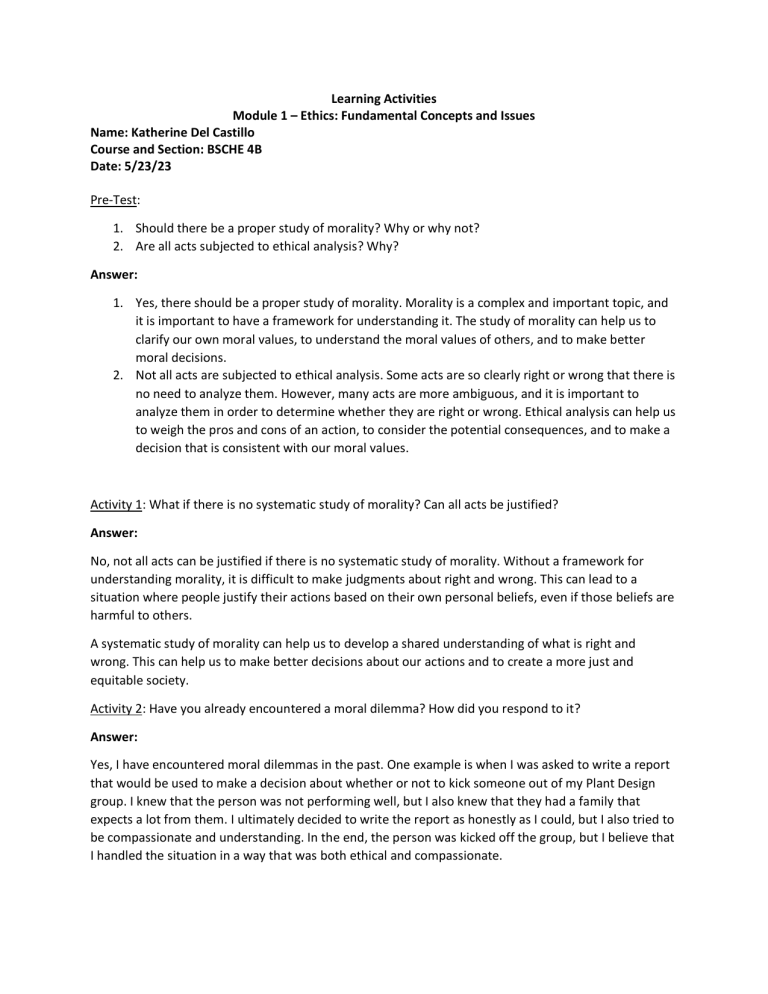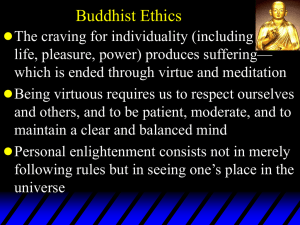
Learning Activities Module 1 – Ethics: Fundamental Concepts and Issues Name: Katherine Del Castillo Course and Section: BSCHE 4B Date: 5/23/23 Pre-Test: 1. Should there be a proper study of morality? Why or why not? 2. Are all acts subjected to ethical analysis? Why? Answer: 1. Yes, there should be a proper study of morality. Morality is a complex and important topic, and it is important to have a framework for understanding it. The study of morality can help us to clarify our own moral values, to understand the moral values of others, and to make better moral decisions. 2. Not all acts are subjected to ethical analysis. Some acts are so clearly right or wrong that there is no need to analyze them. However, many acts are more ambiguous, and it is important to analyze them in order to determine whether they are right or wrong. Ethical analysis can help us to weigh the pros and cons of an action, to consider the potential consequences, and to make a decision that is consistent with our moral values. Activity 1: What if there is no systematic study of morality? Can all acts be justified? Answer: No, not all acts can be justified if there is no systematic study of morality. Without a framework for understanding morality, it is difficult to make judgments about right and wrong. This can lead to a situation where people justify their actions based on their own personal beliefs, even if those beliefs are harmful to others. A systematic study of morality can help us to develop a shared understanding of what is right and wrong. This can help us to make better decisions about our actions and to create a more just and equitable society. Activity 2: Have you already encountered a moral dilemma? How did you respond to it? Answer: Yes, I have encountered moral dilemmas in the past. One example is when I was asked to write a report that would be used to make a decision about whether or not to kick someone out of my Plant Design group. I knew that the person was not performing well, but I also knew that they had a family that expects a lot from them. I ultimately decided to write the report as honestly as I could, but I also tried to be compassionate and understanding. In the end, the person was kicked off the group, but I believe that I handled the situation in a way that was both ethical and compassionate. In general, I try to approach moral dilemmas by considering all of the options and trying to find the solution that is the most ethical and compassionate. I also try to remember that there is no one right answer to every moral dilemma, and that sometimes the best we can do is to make the best decision we can with the information we have. HOW MUCH HAVE YOU LEARNED? 1. What do we mean by the term ethics? Is it different from the term morality? 2. Are all acts subjected to ethical analysis? Why? 3. What are moral dilemmas? Have you already encountered a moral dilemma? How did you respond to it? Answer: 1. Ethics is the study of morality and how people ought to act. It is a branch of philosophy that deals with questions of right and wrong, good and bad. Morality, on the other hand, is a set of beliefs about what is right and wrong. It is often based on religious or cultural beliefs. 2. Not all acts are subjected to ethical analysis. Some acts are so clearly right or wrong that there is no need to analyze them. However, many acts are more ambiguous and require careful consideration. In these cases, it is important to weigh the potential consequences of different actions and to make a decision based on what you believe is the right thing to do. 3. A moral dilemma is a situation in which there is no clear right or wrong answer. In these situations, people are often torn between two or more options that all seem to have negative consequences. There is no easy way to resolve moral dilemmas, and people often have to make difficult choices. Deadline of submission: February 19, 2022




